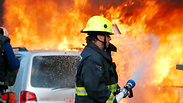
Everything was laid out in his warning – hundreds of rockets every day, severe damage to infrastructure, loss of civilian life, and, if anyone was in any doubt, the closure of Israel's airports. especially Ben-Gurion Airport.
Thus, the rich and the poor, Sephardis and Ashkenazis, Arabs and Jews, those with European passport and those with only an Israeli one – everyone in fact – will be here to stay. Hezbollah chief Hassan Nasrallah, who listened carefully to the major general and others in Israel, was happy to chime in and fill in the blanks: Not only would Ben-Gurion Airport be closed, he vowed from his bunker, the entire country would be closed.
Now another general, Home Front Commander Eyal Eizenberg, is finishing his term. And if Golan's comments from four months ago had been erased from the collective memory, Eisenberg was happy to remind us.
Not hundreds of rockets a day, he said in a final conversation with military correspondents, but 1,500 missiles a day. He added that the state of protection in Israel has deteriorated, and one out of every four citizens is unprotected.
And if this was not worrying enough, anyone who thinks the Iron Dome will be our savior is wrong. There will not be enough Iron Dome batteries, said the departing general, to stop these barrages, and the batteries that there are will be placed close to strategic facilities - air bases, for example. "The citizens of Israel," he concluded, must therefore "be prepared to face the challenge."
At the same festive event, reporters were also informed that city mayors have been updated and were in receipt of what the army described as the new scenario.
In other words, if you, the mayors and heads of regional councils, had been told that only hundreds of missiles would fall, now you must brace yourself for thousands of missiles, and if we told you there would be dozens of casualties, there will in fact be hundreds, not to mention massive environmental destruction, including to infrastructure.
Eizenberg went on to explain that, contrary to some in the general staff, he believes that it is correct to prepare the citizens for the dimensions of the expected devastation, and to tell them the truth.
The obvious question is, after being given a description of city streets as battlefields, what should the public do with this important information? Should they understand that behind all these grim descriptions is a very clear and unambiguous statement, one that can be distilled into four words – every man for himself? Those who do not take care of their own protection will be without it? That Israel is privatizing the Home Front for its eight million citizens, with all that this entails? The only organization, if any, which can be counted on upon the chaotic situation that will prevail is the local municipality?
The Third Lebanon War, if and when it happens, will not be the first conflict in which the Home Front becomes the battlefield. It began in 1991, during the first Gulf War, worsened during the Second Lebanon War in 2006 and hit a new low in Operation Protective Edge last summer, when Hamas rockets repeatedly struck Tel Aviv.
After 25 years of ever-increasing threats to the Home Front, the conclusion is clear. There are armies who define their role as to protect the home front and meet the needs of the population in time of war, from the supply of water and bread to clearing rubble and rescuing the wounded.
When a commander says that citizens should be ready for the challenge to come, one must pay careful attention. Take heed, for what he says to citizens now is what will be said to the committee of inquiry formed shortly after it is all over: We warned you, they will say, and those who did not listen to the warnings and come to the logical conclusions, well, that's their own responsibility.
















